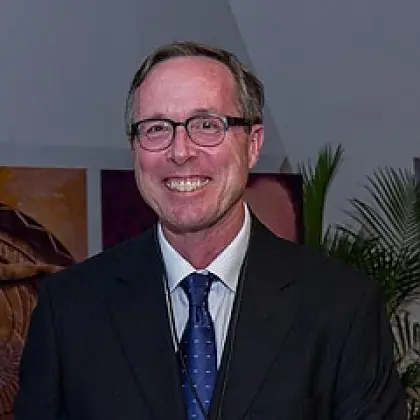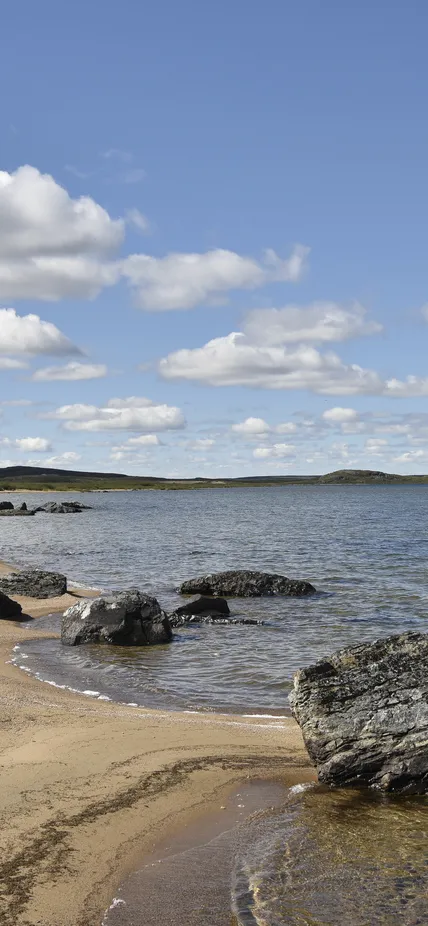
Washington, DC— Richard Carlson, Director of Carnegie’s Earth and Planets Laboratory, has been named a Fellow of the American Association for the Advancement of Science. He was selected for his “outstanding research, leadership, innovation, and service to the community in geochemistry and geology.”
The tradition of AAAS Fellows began in 1874 and election for this honor is bestowed upon AAAS members by their peers. This year 489 members have been selected due to their “scientifically or socially distinguished efforts to advance science or its applications.”
A Carnegie staff member since 1981, Carlson is widely recognized for his use of isotope geochemistry to understand the origin and evolution of the early Solar System, the Moon and the Earth’s ancient crust.
“I am honored to be chosen for membership in the distinguished 2020 class of AAAS Fellows,”
Carlson said. “The AAAS is a longstanding leader in the American scientific endeavor, and I am humbled by their recognition of my work.”
The 2020 class of AAAS Fellows will be formally announced in the AAAS News & Notes section of the journal Science on November 27. A virtual Fellows Forum—an induction ceremony for the new Fellows—will be held in February.
“Rick Carlson’s research has delved into the depths of the Earth’s crusts, interrogated the formation of the moon, and extended into the early solar nebula that created the Solar System,” said Eric D. Isaacs, President of the Carnegie Institution for Science. “Rick’s wide-ranging intellectual curiosity and creativity have made him an inspiration and a role model for everyone at Carnegie Science, and I am delighted to see him recognized by the AAAS for his extraordinary contributions.”
Carlson earned a B.S. in chemistry at the University of California-San Diego and a Ph.D. in Earth science at the Scripps Institution of Oceanography. He is a former editor of the journal Earth and Planetary Science Letters and is a past President of the Geochemical Society. He is a Fellow of the Geochemical Society, American Academy of Arts & Sciences, and the American Geophysical Union, as well as a Member of the U.S. National Academy of Sciences. He received the Geochemical Society’s 2020 Victor Moritz Goldschmidt Award, the AGU’s 2008 Bowen Award, and the Geological Society of America’s 2013 Arthur L. Day Medal.
AAAS members can be considered for the rank of Fellow if nominated by the steering groups of the association’s 24 sections, or by any three Fellows who are current AAAS members (so long as two of the three sponsors are not affiliated with the nominee’s institution), or by the AAAS chief executive officer. They must have been continuous members of AAAS for four years by the end of the calendar year in which they are elected. AAAS encourages its sections and Council to consider diversity among those nominated and selected as Fellows, in keeping with the association’s commitment to diversity, equity and inclusion. The AAAS Fellow honor comes with an expectation that recipients maintain the highest standards of professional ethics and scientific integrity
__________________
The American Association for the Advancement of Science (AAAS) is the world’s largest general scientific society and publisher of the journal Science, as well as Science Translational Medicine; Science Signaling; a digital, open-access journal, Science Advances; Science Immunology; and Science Robotics. AAAS was founded in 1848 and includes more than 250 affiliated societies and academies of science, serving 10 million individuals. Science has the largest paid circulation of any peer-reviewed general science journal in the world. The nonprofit AAAS is open to all and fulfills its mission to “advance science and serve society” through initiatives in science policy, international programs, science education, public engagement, and more. For additional information about AAAS, see www.aaas.org.
